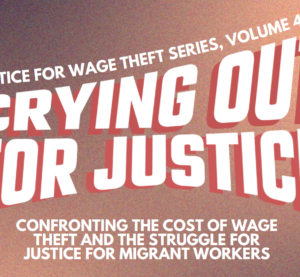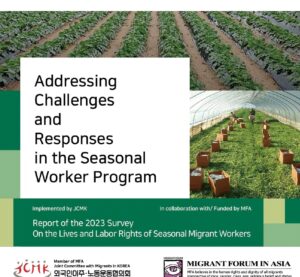Policy Brief No.2 Transitional Justice for Migrant Workers: Responsibilities of Business
— October 24, 2020Transitional Justice for Migrant Workers: Responsibilities of Business
BACKGROUND
Since the onset of the COVID-19 pandemic, millions of migrant workers have been repatriated back to their home countries with months of unpaid wages and benefits due. The issue of wage theft is endemic for migrant workers which has been further exacerbated by the current crisis. To aggravate the situation, migrant workers being repatriated have not been given any opportunity to lodge claims against the abuse, decimating their right to access justice. Wage theft is a violation of labour rights. Each year millions of dollars are lost in potential remittances due to wage theft but in times of this pandemic, wage theft is projected to lead to situations of debt bondage – as migrant workers will be forced to pay off the debt incurred to cover recruitment fees and costs, despite returning empty handed.
In response to this injustice, civil society organisations and trade unions have launched an appeal to governments and businesses to take immediate action to establish a transitional justice mechanism to address wage-related grievances of migrant workers impacted by this pandemic. The appeal seeks businesses to fulfill their obligations under the UN Guiding Principles for Business and Human Rights (UNGPs) – to respect fundamental labour and human rights of migrant workers, including paying their entitlements. Businesses are called upon to support the appeal to establish a robust mechanism for migrant workers with claims to provide access to remedy, and to voluntarily mobilize resources towards a compensation fund[1].
This policy brief will look at the issue of wage theft, what businesses can do to ensure migrant workers’ rights are respected and how businesses can become a catalyst for change in shaping a just world post pandemic.
THE ISSUE OF WAGE THEFT
According to the World Bank, in 2020 remittances are predicted to decline by 20% – which is about $109 billion[2]. A leading World Bank economist highlighted that fall in wages and employment of migrant workers due to COVID-19 are the key factors for this decline. Amongst other factors, wage theft is also a significant contributor[3]. Decline in remittances is certain to impact the economy of low-income countries. The effect is also significant at the individual level for the families of migrant workers who are dependent on remittances for their livelihood. Additionally, migrant workers also take on debt to pay recruitment costs associated with migration. Decline in remittances and possible job losses could lead to defaulting on their debts pushing them further into poverty, forced labour and debt bondage.
The Business and Human Rights Resource Centre (BHRRC) has been recording cases of labour abuse of migrant workers in the GCC countries since 2016. Their record indicates that wage theft is the most commonly reported abuse – sited in 80% of the cases documented. During this time of pandemic, the BHRRC documented almost 400% more cases of abuse compared to the same period in 2019 – of which 77% is related to non-payment of wages due to employers citing economic downturn.
In most cases of wage theft, the victims are vulnerable workers with precarious legal status and lack the knowledge and capacity to seek wage recovery. Recovering wages through state-led judicial mechanisms during normal times was already challenging – pertaining to costly and drawn out processes. During this crisis, the situation has worsened with courts shutting down or moving online. Lack of freedom of association, fear of reprisal from companies, lack of accountability of businesses, inadequate protection from labour laws and complicated legal systems – are some of the key barriers for migrant workers to seek remedy for their claims.
The crisis has exposed the vulnerabilities arising from exclusion of migrant workers from the industrial relations system. Most countries of destination in the Gulf do not legally allow migrant workers to either organise themselves or to join trade unions, restraining them to advocate for their rights and wellbeing. In the absence of trade unions and worker represented committees, migrant workers are deprived from expressing their grievances related to stolen wages and labour abuses.
During this pandemic, there is very little evidence in the Middle East and in Asia to show that businesses have taken proactive measures to ensure migrant workers are duly compensated before repatriation. Businesses out of their responsibility to respect human rights need to put systems in place to prevent human rights abuses, including wage theft and concerns of forced labour, and should provide effective remedy if it occurs.
|
Excerpt of an article ‘The Great Wage Heist’ by Rejimon Kuttappan – migrant rights defender and journalist. Published in ‘The Hindu’ on September 20, 2020
Haneesh Kumar P.B., an Indian migrant supervisor in an automobile company in Oman, was told to resign on April 30, along with some 400 colleagues. In all, the company asked around 1,400 workers to resign in phases, citing as reason the COVID-19-induced economic crisis. Haneesh, who was among the first to go, refused to sign the ‘voluntary’ resignation form and insisted on being terminated so that he could get the attendant benefits. As per his contract, if the company terminated him, it would have to give him either a 30-day notice period or a 30-day salary. As the company couldn’t serve him the 30-day notice period, he was eligible to a month’s basic salary, around $570. He was never paid this amount, additionally he was forced to work until May 11, for which the company did not pay him either. Even more shocking, he didn’t get the $181 food allowance for the 35 days he worked, which he was assured of when he was terminated. Haneesh was denied $960 of due wages by the company. In other words, he was a victim of wage theft, a trend that often goes unreported and unnoticed. In Haneesh’s case, the company failed to pay him for the 10 days he worked, the 30-day salary for being terminated, and the food allowance clearly stated in the contract. “I realised the wage theft only after they credited the amount into my bank account just two days before I travelled out. So, I didn’t have time to complain either to my office nor to the Indian Embassy. I had to just give up that money and fly back,” says Haneesh. All 1,400 employees who were dismissed from the company faced similar issues. If we assume the lowest monthly salary to be $250 and calculate the unpaid amount for 10 days as well as the denied food allowance for each of the 1,400 workers, Haneesh’s company would have saved — or stolen — $369,000 from its workers. [Read full story here]
|
RESPONSIBILITIES OF BUSINESS
Treating people with dignity is always the right thing to do. Enabling access to remedy for exploitation and enhancing corporate accountability is critical not only to addressing wage theft but also to preventing future human rights abuses[4]. Integrating human rights due diligence into corporate risk management process helps businesses to be better positioned to identify and address risks of wage theft. It also minimises future legal and reputational risks and costs associated with it – and this is where adopting good practices bring incentives to businesses.
Complying with national laws and international human rights standards, conducting human rights due diligence, identifying root causes of wage theft and establishing clear processes to remediate breaches when found – should serve as minimal guidelines to ensure justice for migrant workers in this crisis.
Comply with all applicable laws and respect human rights
The UNGPs are an authoritative global framework for preventing and addressing the risk of adverse impacts on human rights linked to business activity. Under pillar two of the UNGPs (Principles 11-24) – all business enterprises have a responsibility to respect all internationally recognised human rights, address any adverse impacts that they may be involved in and treat people with dignity[5]. The principles under UNGPs apply regardless of States’ obligations and standards. Responsibility of businesses to respect human rights is over and above compliance with national laws and is separate from its legal liabilities.
Conduct human rights due diligence
Identifying, preventing, mitigating and addressing adverse human rights impact is the main purpose of human rights due diligence. Risks to people arising from the activities of the business needs to be addressed through conducting human rights due diligence. The UNGPs states that the responsibility of the business extends beyond its activities and includes risks in its supply chains conducted by its partners or suppliers.
The continuous risk management process enables companies to proactively manage potential and actual human rights impacts. In the current crisis, the human rights due diligence process should include ensuring fundamental guarantees such as ensuring health and safety of workers, providing protective equipment’s, providing paid sick leave, and in the case of lay-off paying workers’ due wages, benefits and any other entitlements. Companies should look into its business activities and that of its suppliers and partners to identify how its decisions in the current context is impacting migrant workers – particularly regarding payment of due wages and benefits.
To help businesses consider and manage the human rights impacts of decisions and actions– the UN Development Programme (UNDP) has developed a rapid self-assessment tool for businesses – C19 Rapid Self-Assessment[6]. It helps companies to reflect on the human rights risks and impacts – including issues of wage theft, based on relevant provisions of UN Human Rights Treaties, the ILO Fundamental Conventions, and the UNGPs. Similarly, BHRRC has also published a guidance on using the due diligence framework to manage the crisis[7].
Ensure access to effective remedy
Rights without remedies do not mean much in practice. Government and businesses alike need to strengthen accountability mechanisms. Pillar three of UNGPs expects both states and businesses to provide effective remedies. Businesses are expected to manage risks of human rights harms with a view to avoiding them and to establish effective operational-level grievance mechanisms (Principle 29).
As stated under UNGPs – “where business enterprises identify that they have caused or contributed to adverse impacts, they should provide for or cooperate in their remediation through legitimate processes.” Businesses are required to provide remedial measures that are accessible, affordable, timely and adequate – while ensuring remedies are proportional to the gravity of human rights violation and be able to repair the harm as much as possible.
When businesses are directly causing adverse human rights impact – in this case wage theft – immediate action must be taken to cease or prevent the impact. If the wages are being withheld or denied by its suppliers or partners, companies should firstly ensure they are not playing a contributing role, and then use its leverage to ensure remediation.
Businesses should engage with external stakeholders including government, civil society, National Human Rights Institutions and workers associations to ensure effective implementation of its remediation actions. Collective actions for example industry collaborations, trade associations and industry coalitions are deemed more effective than individual business responses to tackling systemic challenges of wage theft.
TRANSITIONAL JUSTICE MECHANISM – ROLE OF BUSINESS
Support calls for the establishment of International Claims Commission and Contribute to Wage Compensation Fund
The current crisis is an opportunity for businesses to express their commitment to respect human rights. Upholding migrant workers’ rights is a collective responsibility to shaping a better world post pandemic. Businesses need to demonstrate their efforts to do the right thing by upholding the principles of internationally recognized human rights to the greatest extent possible, adhering to the UNGPs and complying with national laws.
Civil society is, therefore, calling upon businesses to support its appeal for the establishment of an International Claims Commission as a specialized international quasi-legal body to adjudicate on cases related to wage theft and other outstanding claims of migrant workers on an expedited basis[8]. The Commission will provide for a flexible and robust remedial system to ensure repatriated migrant workers have access to an affordable, accessible and expedited justice mechanism without fear of reprisal. It will oversee legitimate cases of wage theft and make compensations to migrant workers from the Wage Compensation Fund – established from voluntary monetary contributions by the government, private contributions, businesses and philanthropic foundations.
Recommendations
In this crisis businesses should foster a race to the top on questions of corporate responsibility. It should consider the impact of their decisions and actions on workers and have meaningful consultation with their representatives and other relevant stakeholders to address and resolve grievances.
Businesses should consider the following recommendations –
- Establish operational-level grievance mechanism – Businesses should establish independent and confidential complaints mechanism for migrant workers to raise concerns of wage theft. The mechanism should serve to document cases of wage theft and provide effective remedies. The mechanism should be independent and enable migrant workers to file claims without fear of retaliation, intimidation, harassment or discrimination. A comprehensive report on Effective Operational-level Grievance Mechanism by International Commission of Jurists can be accessed – here
- Provide remedies – According to UNGPs, enabling access to remedy is not optional. Companies should ensure effective remedial measures for harms – including wage theft, that business has caused or contributed to by its activities. Businesses should establish a wage-guarantee system and wage-fund. In cases of wage theft – workers should be remunerated immediately from the wage-fund.
- Support workers in supply chain – Companies should take urgent actions to assess risks in its supply chains and provide mitigation measures to avoid unintended consequences to workers. Companies should ensure that there are no cash flow issues that will affect payment of wages to workers in the supply chain.
- Compensate furloughed workers in accordance with relevant laws, regulations and contract – Retention of workers should be prioritised against lay-off. Companies should consider the development of a job protection plan to assess all available options for retention of workers. Where furlough is inevitable, companies should take all measures to ensure workers are compensated in accordance with relevant laws, regulations and agreements to mitigate any negative impacts on workers.
- Adopt anti-retaliation and human rights policies – Developing human rights policies helps businesses to manage human rights risks better. In this crisis businesses should take the leadership role to enhance worker protection. Businesses should adopt anti-retaliation and whistle-blower protection policies to ensure migrant workers using complaints mechanism can do so without fear of penalty, dismissal or reprisal. Guide on Developing Human Rights Policy can be accessed – here
- Ensure freedom of association for all workers including migrant workers – Industrial relations processes involving management and trade unions serve as a form of operational-level grievance mechanism. It is therefore crucial to ensure freedom of association to build support for company led complaints and redressal mechanisms. Where it might not be legally possible to establish trade unions, companies should permit and promote independent worker committees.
- Promote cooperation and collaboration – Stakeholder consultation is key to understanding and resolving issues of wage theft and other labour issues. Companies should collaborate with governments, trade associations, stakeholder groups including workers and civil society organisation to better address issues arising out of the COVID-19 crisis. Businesses should call upon states to establish effective wage-protection systems, to extend safety nets to cover migrant workers and support stronger legislations to protect migrant workers.
[1] https://mfasia.org/covid-19-a-time-for-businesses-to-act-responsibly-in-ensuring-justice-for-migrant-workers
[2] https://www.worldbank.org/en/news/press-release/2020/04/22/world-bank-predicts-sharpest-decline-of-remittances-in-recent-history
[3] Reflections at a webinar organised by MFA, CCRM and GRFDT on 21 August 2020
[4] https://www.ohchr.org/EN/NewsEvents/Pages/DisplayNews.aspx?NewsID=25837&LangID=E
[5] https://www.ohchr.org/Documents/Publications/GuidingPrinciplesBusinessHR_EN.pdf
[6] https://www.undp.org/content/undp/en/home/librarypage/democratic-governance/human-rights-due-diligence-and-covid-19-rapid-self-assessment-for-business.html
[7] https://media.business-humanrights.org/media/documents/files/documents/COVID_19_business_and_human_rights.pdf
[8] https://mfasia.org/appeal-no-2-urgent-justice-mechanism-for-repatriated-migrant-workers-now/
You may download the PDF Version of the Policy Brief here: Policy Brief 2 Business and Transitional Justice_10.22.2020



